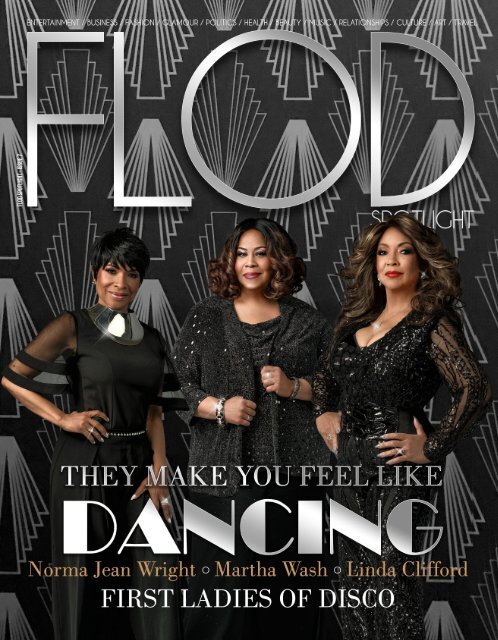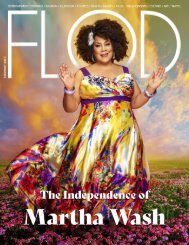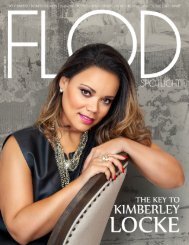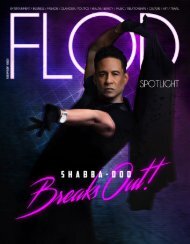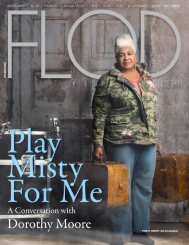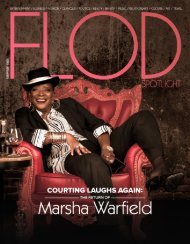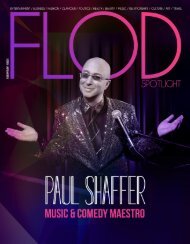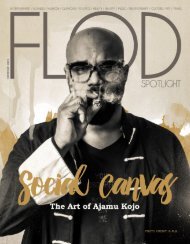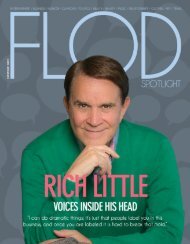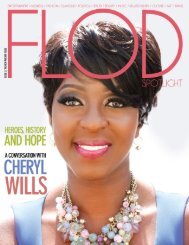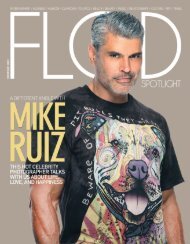FLOD Spotlight - Issue 7
They Make You Feel Like Dancing - Norma Jean Wright, Martha Wash and Linda Clifford - First Ladies of Disco
They Make You Feel Like Dancing - Norma Jean Wright, Martha Wash and Linda Clifford - First Ladies of Disco
Create successful ePaper yourself
Turn your PDF publications into a flip-book with our unique Google optimized e-Paper software.
(the drummer) were having a jam session and I was just blown<br />
away by their musical skills and their ability to play. As a unit, they<br />
were extraordinary. I just felt this is really something special. Then<br />
they played some of their original music and I was very impressed<br />
with it. It was fresh, new, and had components of mainstream<br />
music that I felt everybody would love once they heard it and they<br />
did. I just didn’t know it would be that huge, but 40 years later, the<br />
music is still loved.<br />
Your time in Chic ended in 1978 because you got<br />
signed to Warner Brothers/Bearsville Records to be<br />
a solo artist. You wanted to stay in the group and do<br />
solo work on the side, but unfortunately, things didn’t<br />
work out that way. What was the ending like for you<br />
when you had to part ways?<br />
I was sad because I didn’t even initiate the solo situation. Bernard<br />
and the Executive Producers had that all set up. The plan was that<br />
I would do the solo music and continue on with Chic because<br />
Warner/Bearsville was under Atlantic Records, where Chic was<br />
signed and I was signed under Warner, so it was all under the<br />
same corporation, but when the plan didn’t go down as I was told<br />
it would, I was heartbroken. I loved working with Chic and in a<br />
group setting, but what could I do except continue on.<br />
PHOTO BY KAT ARMENDARIZ<br />
By Call Me Adam (Adam Rothenberg)<br />
Who or what inspired you to become a singer?<br />
I grew up in Ohio, in Cleveland, in a small industrial city called<br />
Elyria and my mom was constantly singing because she loved to<br />
sing. I listened to Motown music, Aretha Franklin, Gladys Knight,<br />
Nancy Wilson, and all those wonderful singers. I would watch The<br />
Supremes on TV. All of that is what inspired me to become a singer.<br />
You are widely known for being the lead singer of<br />
Chic. How did you first come to be in the band?<br />
I was introduced to Nile Rodgers and Bernard Edwards after I<br />
moved to NYC from Ohio. My friend, Layne Davis, who is still one<br />
of my best friends, said to me “I know these guys, they are great<br />
musicians, they are putting a group together and they are looking<br />
for a lead female vocalist.” She told me I should audition, so I did,<br />
and I ended up getting the gig. It was amazing because I was only<br />
living in New York for about six months when I joined Chic.<br />
What did you love about being in Chic?<br />
PHOTO BY KAT ARMENDARIZ<br />
When I got to the audition, Nile, Bernard, and Tony Thompson<br />
It didn’t turn out to be so bad on my own because I got to work with<br />
Luther Vandross, Madonna and many other artists I wouldn’t have<br />
been able to work with had I stayed on with Chic. We would have<br />
been on tour and I wouldn’t have been able to do a lot of the session<br />
stuff. I ended up writing songs too. I got to work with Kenny Burke.<br />
We wrote “Risin’ To The Top.”<br />
Even though things didn’t go as planned, I still ended up doing<br />
pretty well and I’m thankful for that. And now, I have the legacy of<br />
Chic plus a few other things. I’m happy now, but at the time I was<br />
very sad.<br />
Speaking of the other artist you have worked<br />
with, (Aretha Franklin Debbie Gibson, and as you<br />
mentioned earlier, Madonna), do you have any stories<br />
about working with them that you could share with<br />
us?<br />
The Madonna story I’ve told so many times that it’s probably<br />
redundant now because nobody knew she was going on to be this<br />
huge star. I had met her at a dance class and as I’ve said numerous<br />
times before, she was an extraordinary dancer. I was like, “Who<br />
is this chick dancing like this?” I had met her and we ended up<br />
hanging out/being friends and that’s how I ended up on her first<br />
album. I introduced her to several people in the business because<br />
at that time, Chic had released our first album and we were doing<br />
well, and there were people in the industry I knew.<br />
As I mentioned before, Aretha and Gladys Knight were two singers<br />
I really admired & tried to sing like. So when Luther Vandross called<br />
me to sing on “Jump To It” on Aretha’s album he was producing, I
was just like “Oh my goodness this is a dream come true.” Oh, what<br />
an enormous loss we just had with her passing. I feel very sad about<br />
that. There is nobody like her and there will NEVER be another<br />
Queen of Soul.<br />
And with Debbie Gibson, which album did you work on?<br />
I worked on her first album, Out of the Blue. She was very, very<br />
talented. Debbie was very young then and that album really blew<br />
up. I knew Debbie and her mom because her mom managed<br />
Debbie at the time. She & her mom were just very kind and warm.<br />
What do you feel has been the hardest part, for you,<br />
about the change in the music industry since you<br />
started?<br />
“I’m happy now, but at the time<br />
I was very sad.”<br />
There were so many venues to play at in those early days, but a lot of<br />
them have since closed. And with the onset of the internet, it’s hard<br />
to stay on top of collecting your money regarding publishing, but<br />
it’s getting better now because of agencies like Sound Exchange who<br />
help collect money.<br />
What change do you feel has helped enhance the<br />
music industry that you didn’t have when you were<br />
with Chic or just starting out?<br />
There is so much more visibility now because of the internet. When<br />
you think back, Chic’s music was known, but you didn’t really have a<br />
face to put to the music because we didn’t have the type of platforms<br />
that are available today like YouTube & Spotify. We didn’t release as<br />
many videos as people do now. There’s a lot of visibility and it’s a<br />
smaller world as a result of that. The access to other countries is right<br />
there, available, in front of you, on your computer. As they say, it’s<br />
been a curse and a blessing.<br />
Now let’s get to the First Ladies of Disco. How did you<br />
become part of this entity?<br />
Well, all of this started as a result of a book authored by James Arena.<br />
He wrote this book, First Ladies of Disco, and there are 32 women<br />
featured in this book. I’m one of the women in the book, along with<br />
Martha Wash, Linda Clifford, Gloria Gaynor, & the list goes on and<br />
on. After the book was written, James Washington, who happens<br />
to be Martha Wash’s Manager & creator of the First Ladies of Disco<br />
show, put the concept together. Then I was invited to participate and<br />
that’s how it started for me.<br />
What do you enjoy most about working with Martha<br />
and Linda?<br />
As I mentioned earlier, I’ve always been one to enjoy working in<br />
a group setting. We all perform individual sets and then we come<br />
together for a tribute medley and a finale. It’s a team effort. I’ve<br />
always said, “If you have a great team or collective, you can’t beat<br />
that.” I love the shine we all get from being a team.<br />
What do you have coming up that you can share with us?<br />
The First Ladies of Disco will be doing a Christmas show in NYC at<br />
Joe’s Pub on November 29th and 30th.<br />
I performed in Sydney Australia, at Sydney’s Opera House as<br />
part of Disco Spectacular, backed by a 42-piece orchestra. We<br />
performed our disco hits, which<br />
I was very excited about. My<br />
song, “Saturday,” was remixed<br />
by Dimitri from Paris, and I<br />
got to perform that version of<br />
“Saturday” for the first time<br />
along with some of the other<br />
classics I do.<br />
I’m still working with Alfa<br />
Anderson and Luci Martin, the other two lead vocalists from<br />
Chic. We have some shows coming up. Our friendship and<br />
working relationship is stronger than ever. It’s wonderful to still<br />
be working together after all of these years. Now our demographic<br />
is millennials and the X generation all the way up to folks in their<br />
80s/90s. It is just terrific.<br />
The First Ladies of Disco performed with the Huntington Symphony<br />
Orchestra a little while ago. We performed our single “Show Some<br />
Love” and there were some teenagers, 15 or 16 years old, singing<br />
along to this song as well as some of our other hits. Their parents<br />
were singing along too. It was great to see everyone appreciating<br />
the music.<br />
I have a component to my interviews called “I Can See<br />
Clearly Now,” where I try to clear up misconceptions<br />
about my interviewees. What do you feel is the<br />
biggest misconception out there about yourself that<br />
you would like to clear up right now?<br />
I think we touched upon it at the beginning of the interview.<br />
There are so many people who thought, with my solo career, I just<br />
decided to leave Chic and go out on my own. That was the biggest<br />
misconception of all because who would leave a hit group and go out<br />
and test unknown territory? I think this has now been cleared up.<br />
When you look back on your life and career, what<br />
makes you go “I can’t believe I got to do that” and<br />
what makes you go “Oh I wish I got to do that”?<br />
Well, I can’t believe Chic was nominated 11 times for the Rock and<br />
Roll Hall of Fame and never made it in. I hope, oh, it doesn’t matter,<br />
because we were nominated and the music speaks for itself.<br />
I wish we could have won a Grammy for some of that music. I also<br />
wish, but it’s not going to happen because they are no longer here,<br />
so this would have to be in the heavenly choir, but I wish I could<br />
work with Luther Vandross, Nile Rodgers, Bernard Edwards, Tony<br />
Thompson, and Raymond Jones again. I miss the old crew. They<br />
were such great mentors and friends. I’m so blessed to have had<br />
that time with them.<br />
And I’m grateful that I’m still standing, in good health, surrounded<br />
by great family and friends!<br />
By Call Me Adam (Adam Rothenberg)<br />
PHOTO BY KAT ARMENDARIZ<br />
Who or what inspired you to become a singer?<br />
Right off the bat, huh? It’s so funny because I started singing at<br />
such a young age (4-years-old) that I don’t think there was any one<br />
person who influenced me. I just thought it was fun.<br />
As I got older, I certainly had my singing heroes, one of which was<br />
Aretha Franklin, whom we recently lost unfortunately. Aretha and<br />
I are not that different in age, so to have someone close to my age<br />
doing the things that she did and recording the songs she made<br />
really set me on fire to get out there and be a singer. Then later in<br />
my career, I actually got to sing some of the songs Aretha recorded<br />
and that was very cool.<br />
Gladys Knight and Dionne Warwick were other influences of mine.<br />
I just saw Gladys in concert recently and her voice is as strong<br />
today as when she started. Unreal! I want to be her when I grow<br />
up [laughs].<br />
When you started out singing your focus was on jazz,<br />
but ultimately you switched to R&B/Pop. What do<br />
you think made you change your musical focus?<br />
I think the audiences I was working for had a great deal to do with<br />
that. I worked a lot of nightclubs before I started recording. People<br />
would come in and request certain songs. I would think to myself,<br />
“You’d rather hear that than this? Okay.” So, I started singing the<br />
songs they were requesting. One of the main reasons you go into<br />
this business is to satisfy your audience and make them happy.<br />
Music brings such joy to people, so you want to make them happy<br />
and you do the songs they ask for.<br />
What challenges do you feel you faced when you<br />
switched genres?<br />
I always found that music, no matter what type of music, made me<br />
feel good. Quite honestly, I found myself getting more work after I<br />
started to sing R&B/Pop. I booked gigs around the country. It gave<br />
me a lot more confidence in myself as a singer because I thought,<br />
“Wow, I can do that, that, and that (meaning different genres of<br />
music). It was a positive experience for me in the long run.<br />
Do you remember when you first felt like you had<br />
success with R&B/Pop? What was that moment like?<br />
I was working a supper club in Fullerton, CA, and someone came<br />
in and actually said, “Do that ‘Yeah Yeah’ song by Sly & The Family<br />
Stone. I’m thinking to myself, “This is a dinner club, you don’t want<br />
to hear me screaming that song” [laughs], but they were like “Yeah,<br />
do that song” and we did it. I remember the club owner having a<br />
stroke [laughs], he was like “What the hell is going on?” But then<br />
he realized all the people who were sitting, having their dinner,<br />
were up singing & dancing, having a great time. Then he said to<br />
us, “You know, that’s not my kind of music, but if you are going to<br />
do it, could you do it a little softer?” [laughs] Then that became the<br />
standard every night we were there, we had to sing that song. The<br />
gig was for six weeks. To me that was a great success.<br />
I think recording wise, I felt like I had success when I did “Runaway<br />
Love,” which I wrote about my ex-husband. This song was based<br />
upon our relationship. When we were on tour for “If My Friends<br />
Could See Me Now,” we had the radio on and “Runaway Love”<br />
came on the radio, we all gasped.<br />
When we recorded that song, we were looking for material at
that time, so the band was just playing around and I got up to the<br />
microphone and started talking and they recorded it. It was kind of<br />
done as a joke and then they said, “Oh my God, this is a smash. This<br />
is going to be a huge hit.” I was like, “You can’t release that. You can’t<br />
let people know what is going on in my life.” I got into a big fight<br />
with the record company and of course, at that stage in my career,<br />
I was young and dumb, and signed whatever they put in front of<br />
me and I really didn’t have a choice in whether it was released or<br />
not. Then next thing I knew, that song was all over the radio. I then<br />
got requests from different radio stations around the country to<br />
come and talk about the song on the radio. That was a kind of an<br />
interesting and “Come to Jesus” moment all at the same time. It was<br />
like, “Girl, you got a hit whether you like it or not.” [laughs]<br />
It was an incredible feeling to hear my song on the radio. It’s amazing<br />
and scary all at the same time. For a while in my career, I stopped<br />
traveling and started doing television and radio commercials,<br />
jingles and voice overs, and I remember being in the car, hearing<br />
this music come on and I go, “Gee, this sounds familiar” and<br />
then I realized, “Oh my God, that’s me!” It was a Michelob Light<br />
commercial that ran for like four years and I was like “Thank You<br />
Jesus!” [laughs] That was kind of awesome. I was very grateful for<br />
those times.<br />
I was going to get to this later, but since you brought<br />
it up, let’s talk about this now. At the height of your<br />
fame, you decided to focus on your personal life and<br />
raise your family. How did you come to this decision?<br />
Did you worry that if you walked away, there would<br />
be no going back?<br />
I didn’t worry about not being able to go back. The main reason that<br />
I left was realizing that I was working myself to death, the record<br />
company was making all the money and I had nothing, except my<br />
family. It was more important to me to have a wonderful home<br />
life, which I managed to have in spite of everything else. I’ve been<br />
married to a wonderful man for 40 years. We have two wonderful<br />
children. One from my first marriage, which my husband raised<br />
as his own, and then my husband & I had a daughter together. If I<br />
have nothing else, I can say, “We were good parents and raised two<br />
incredible people.”<br />
After some time away, the record company came to me because<br />
they wanted to resign me. I thought to myself, “Wait a minute, if<br />
you take a look at my account with you, you will see your secretary<br />
took a vacation and billed it to me. You will also see that I’ve been<br />
charged for the same instrument four times. You people are lying<br />
and cheating and stealing from me. Why would I want to work for<br />
that? Why would I want to go back to the same kind of treatment<br />
of being used and abused?” So, I didn’t.<br />
I’ve reached an age now where I just feel empowered. It’s going to<br />
be this way or it’s not happening.<br />
When did you start songwriting? What do you like<br />
most about the songwriting process?<br />
I actually started writing when I was in high school. I loved to<br />
write poetry. It occurred to me one day, “Why don’t you ask<br />
someone to put music to this?” At another point, someone I knew<br />
had written a melody and I had put words to it. I thought, well, this<br />
is songwriting 101, but I know I can do this.<br />
I was signed with Warner-Chapel for two years. They had some<br />
great acts, so you could get your music placed with some great<br />
people. I got a call one day from the record label and they said,<br />
“Gloria Gaynor is looking for some new music. Can you write<br />
something that she might like? You know she’s very religious, you<br />
have to keep that in mind.” I thought about it for a bit and then<br />
wrote a lyric for her and they came up with some music for her and<br />
she liked it. She loved it. She recorded it on a CD and I thought,<br />
“Well isn’t that cool! I’m glad I did that, aside from the things I’ve<br />
written for myself.”<br />
Then my friend Martha Wash mentioned that she was going to do<br />
a Gospel CD. I had never thought I would do a Gospel CD, but at<br />
some point before I spoke with Martha, I would wake-up in the<br />
middle of the night with these lyrics in my head and I would try to<br />
go back to sleep, but I couldn’t. So, I would get up and write them<br />
down and go back to sleep. Then the next night, the same thing<br />
would happen and it just kept happening. I wrote these songs and<br />
I was like, “Wow.” One of them was very near and dear to my heart<br />
being about some of the things I had been through in my life. Then<br />
I sang them for Martha and she said, “Wow! Can I record these?”<br />
I was like, “Uh, yeah!” She ended up recording three out of the<br />
four songs I wrote. “You Lift Me Up” was one of the tunes, Martha<br />
recorded, that made it into the Top 5 on the Billboard charts. Then<br />
there was one that was a ballad, “Wash Me Lord,” and that song<br />
came to me like water coming out of a faucet. I just sat down and<br />
the words just poured out of me. That’s probably my favorite song.<br />
One of my other favorite artists you also wrote for<br />
was Cher.<br />
Oh my gosh, yeah! This was also Warner-Chapel and they were like<br />
Cher’s going into the studio and she’s looking for a song. I think at<br />
the time, I was doing a writing tour in the UK. We came up with<br />
this song, sent it to Warner-Chapel and they came back to us saying<br />
Cher liked the song. We were like, “What?!?” Unfortunately, she<br />
ended up not using the song, but at least I know that she liked it<br />
and that made me feel good.<br />
I kick myself sometimes for not writing more. I should get a bit<br />
more involved in the writing aspect of this business because I have<br />
been fortunate with the things I have written, whether for myself<br />
or other people. Sometimes I get that voice in my head that makes<br />
me wonder whether or not my stuff is good enough to show to<br />
somebody and I hold back. I’m still at that place despite of the<br />
success I have had. I just have to push through that voice and write<br />
more because I’ll never know unless I try.<br />
The music industry has changed quite a bit since you<br />
started out. What has been the hardest part for you of<br />
this change? What part of the change are you excited<br />
by?<br />
I think the hardest thing for me to adjust to is there aren’t many<br />
record companies around anymore. Record companies used to<br />
take an artist and build a long-term career with you. When I was<br />
starting out, I walked out on the stage by myself and sang. I didn’t<br />
lip sync. I was the excitement. I knew how to perform.<br />
That’s not the case anymore. The younger you are the more they<br />
want you. You don’t have to have talent. You have to have a look.<br />
You have to have a story. They are not looking to build careers.<br />
They want the fast buck now.<br />
Now, let’s move to the present. You are part of the First<br />
Ladies of Disco, along with Martha Wash, Norma Jean<br />
Wright & a host of other artists from the Disco era.<br />
How did you become part of this entity?<br />
Let’s go back to where the idea originally came from. James Arena<br />
wrote this incredible book called<br />
First Ladies of Disco. He did that<br />
because he was such a fan of the<br />
music. Someone contacted me<br />
about the book and I said it was<br />
okay for them to have James<br />
Arena get in touch with me. It<br />
turns out I was the first person he<br />
interviewed for the book.<br />
He interviewed me and the other ladies I told him about including<br />
Martha Wash, whom I’ve known for so many years, since her days<br />
with Sylvester. Her manager, James Washington, Martha & I ended<br />
up working on a gig together. We got along really well, talking<br />
about the old days. James Washington came up with this idea of<br />
putting together a show of these women. It started from there and<br />
has grown since.<br />
I’m so happy to be part of it. We’re touring around the country with<br />
this show, First Ladies of Disco, and it’s just great.<br />
What have you enjoyed most about working with<br />
them?<br />
The camaraderie between us both on-stage and off-stage. It’s like<br />
hanging out with your girlfriends. It’s amazing. When we are out<br />
there together watching the audience is insane. The audience just<br />
loves the show. They go crazy.<br />
We are just so appreciative of them. They know all the songs. They<br />
sing along. They dance. It’s a great show. It’s a fun show.<br />
What is coming up for you that you can share with us?<br />
Four of my CDs were just re-mastered and re-released. So I’ve been<br />
touring myself along with The First Ladies of Disco. I’m taking a<br />
short vacation, but then I’ll start touring again to promote the CDs.<br />
It’s almost like they are brand new. Fans are writing to me to tell me<br />
how much they love the sound. It’s a great feeling that this stuff is<br />
happening again, a second time around. I’m also going to work on<br />
getting the other four CDs re-mastered. Rest during the holidays<br />
and then in the New Year start touring again.<br />
I have a component to my interviews called “I Can See<br />
Clearly Now,” where I try to clear up misconceptions<br />
about my interviewees. What do you feel is the biggest<br />
misconception out there about yourself right now,<br />
that you’d like to clear up?<br />
People throw around the word Diva a lot. Diva’s are not nice most<br />
of the time. I don’t consider myself a Diva. I’m pretty down to earth<br />
and I’m just me. I love people. If you go on my Facebook page or<br />
Twitter feed, you’ll see, I try to write to people every single day. I<br />
love my fans. They made a difference in my life. They changed my<br />
life. They gave me something I could never have without them. So<br />
I want them to know I appreciate it.<br />
“You know, that’s not my kind of<br />
music, but if you are going to do it,<br />
could you do it a little softer?”<br />
When you look back on your life/career, what makes<br />
you go, “I can’t believe I got to do that?”<br />
There are two things I can’t believe I got to do. One is my<br />
performance at Lincoln Center. I got to perform at Lincoln Center<br />
in Avery Fisher Hall. Growing up in New York, I would go there<br />
to see concerts and shows and all of a sudden I’m there in my own<br />
dressing room getting ready to go on stage and perform. I thought,<br />
“Holy crap! This is amazing!”<br />
The second is I got to be on American Bandstand, stand next to Dick<br />
Clark and have him interview me. We had this great conversation<br />
and I cried on air. He made me cry. He asked me, “What’s the most<br />
exciting thing you’ve done since you’ve had this success?” I said,<br />
“This is it. Standing next to you, being on this show right now. I<br />
grew up watching you on TV and I just adore you.” Then I just<br />
started crying.<br />
What makes you say, “Oh, I wish I got to do this?”<br />
I think I’d like to get back into acting more. I did some when I was<br />
younger, but I was too impatient for it. I want to do Broadway. I<br />
would love to do it. I want to do a Broadway musical so badly! That<br />
would be my moment. I could die ha¬¬ppy then. [laughs]
smaller than I’m used to performing on, so that’s been interesting<br />
to work with. Audience members who are sitting in the front row<br />
can pretty much see my tonsils [laughs].<br />
What made you want to be part of WaistWatchers the<br />
Musical initially?<br />
I thought I would take a chance and do something that I’ve never<br />
done before and really challenge myself. I had to learn all the songs<br />
(we sing about 18-20 songs in this show), plus the dialogue, plus<br />
the dancing. It’s been fun, but it’s challenging, yet I’m still standing,<br />
so I must be doing something right [laughs].<br />
What do you relate to most about the show?<br />
My character, “Connie” is the oldest of the group. She has a husband<br />
and kids and it seems like she’s lost her sexy. She’s coming to the<br />
group to get her sexy back.<br />
are going around. That’s how he put this show together.<br />
Even though we are a little older, it doesn’t mean we are not relevant<br />
in performing or putting music out because we still are. You might<br />
not hear us on the radio, but you can still hear us on internet radio.<br />
That is why the concept works. It shows people we are still here,<br />
touring, and making music.<br />
What has been the best part about performing with<br />
Linda Clifford and Norma Jean Wright?<br />
I’ve known them for years and years and years, so it’s a fun kind of<br />
sisterhood that we go out there and perform together. We have a<br />
blast both backstage and onstage.<br />
The audience feels our energy and in turn they have a great time.<br />
They want to hear our classic music, maybe more so than what we<br />
What projects do you have coming up that you can<br />
tell us about?<br />
I’m still working on a new album that will be out in 2019. I’ve been<br />
taking my time with it because I want it to get it the best I possibly<br />
can, so I haven’t been in any real hurry to release it.<br />
I’m touring with my shows, the First Ladies of Disco and continuing<br />
to do WaistWatchers.<br />
I’m also looking for new artists to put on my record label Purple<br />
Rose Records and putting out another song with First Ladies of<br />
Disco. We are in the process of working on that.<br />
I continue my work with <strong>FLOD</strong> Magazine and my YouTube talk<br />
show 10 Minutes with Martha Wash.<br />
I’m not married nor do I have kids, but I still identify with “Connie”<br />
in being the size that I am and trying to get myself back in shape.<br />
There are some exercises I will do, others I won’t because I can’t. I<br />
leave those to the younger girls in the show to perform [laughs].<br />
When we meet the audience after the show, many of the women<br />
that come up to me say, “I’m Connie, I can relate.” That’s been<br />
another fun part, relating to some of these women.<br />
“I thought I would take a chance and<br />
do something that I’ve never done<br />
before and really challenge myself.”<br />
By Call Me Adam (Adam Rothenberg)<br />
PHOTO BY KAT ARMENDARIZ<br />
Last time we spoke you were starring in the Fresh<br />
Grind Festival’s production of I Want To Eat Brains.<br />
Now you have been co-starring in WaistWatchers the<br />
Musical in Chicago that is enjoying an open run.<br />
What lessons from I Want To Eat Brains did you bring<br />
with you to WaistWatchers the Musical?<br />
Being able to work with different people. With WaistWatchers it’s<br />
about five of us, with I Want to Eat Brains, it was about ten. I am<br />
learning more about musical theatre as I go along. This particular<br />
area of entertainment was not something I thought about doing,<br />
per se, but this opportunity came my way. I wasn’t quite sure what<br />
I was getting myself into, but it’s been very interesting for me, both<br />
physically and mentally.<br />
We are doing seven shows a week and this show is very physical. It’s<br />
a 90-minute show with no intermission. We are constantly moving<br />
and it has taken my body through some changes, I have to say. I’ve<br />
lost weight during this show, which is a side bonus of doing this<br />
show.<br />
It’s been fun working with these other ladies. The space is a lot<br />
It has really been a blast. My castmates and I hold each other up<br />
every night we have to perform. We just have fun and the audience<br />
can see that and in turn, they have fun as well.<br />
Since WaistWatchers is about dieting, exercise, plastic<br />
surgery, sex and self-love, what tips/advice would you<br />
have for other women about these topics that you<br />
have embraced?<br />
You have to love yourself. It doesn’t matter what size you are. You<br />
have to love yourself where you are in that particular moment.<br />
If you want to do something to change yourself, whether other<br />
people agree with you or not, at the end of the day, you have to live<br />
with yourself. You have to be happy with yourself. When you’re<br />
ready to make those changes, then you’ll do it.<br />
Now let’s switch topics for a bit and talk First Ladies<br />
of Disco show. What was your immediate reaction<br />
when you were approached about putting this show<br />
together?<br />
I thought it was a great idea. James Washington had the idea to<br />
expand on the book that James Arena wrote.<br />
James Washington thought there are still a lot of these artists out<br />
there that people are forgetting about, so why not have the original<br />
singers perform their music instead of the many tribute bands that<br />
record today, because it brings back memories for them. It brings<br />
back a time when people went to clubs to have fun and dance.<br />
Speaking of memories, what are some of your fondest<br />
memories of the disco era?<br />
Probably when I started singing with Sylvester in the mid-70s. It<br />
was just about the music and going to the clubs. I was barely 21. I<br />
was just a wide-eyed kid going to these clubs dancing, meeting my<br />
friends, and making new friends.<br />
I remember the times when one particular song would come on<br />
and everybody hit the dance floor at the same time and just a line<br />
dance would form. Like “The Hustle.” It was just innocent fun. We<br />
knew the drugs were out there and people were doing them over<br />
in the corner, but for the most part, people just wanted to go out<br />
there, have fun, drink and dance.<br />
What differences do you notice about how you<br />
perform today as opposed to back in the days of disco?<br />
Cell phones. That is the number one thing for me. It drives me<br />
nuts. Everybody is taking your picture. They’re recording you. I’m<br />
saying to myself, “Put the damn phone down. Get into the music.<br />
Dance. Sing. “<br />
With all you have going on, how do you stay healthy<br />
and not get run down?<br />
I pray a lot and take my vitamins.<br />
What would you still like to accomplish that you<br />
haven’t?<br />
I would like to record a Gospel album. Maybe I’d like to record a<br />
Jazz or Standards album. This would be totally different from what<br />
people would expect me to do. That’s a good thing because I don’t<br />
ever want to be put into one particular box or genre of music. That’s<br />
why I keep it flexible as far as the genres of music are concerned.


